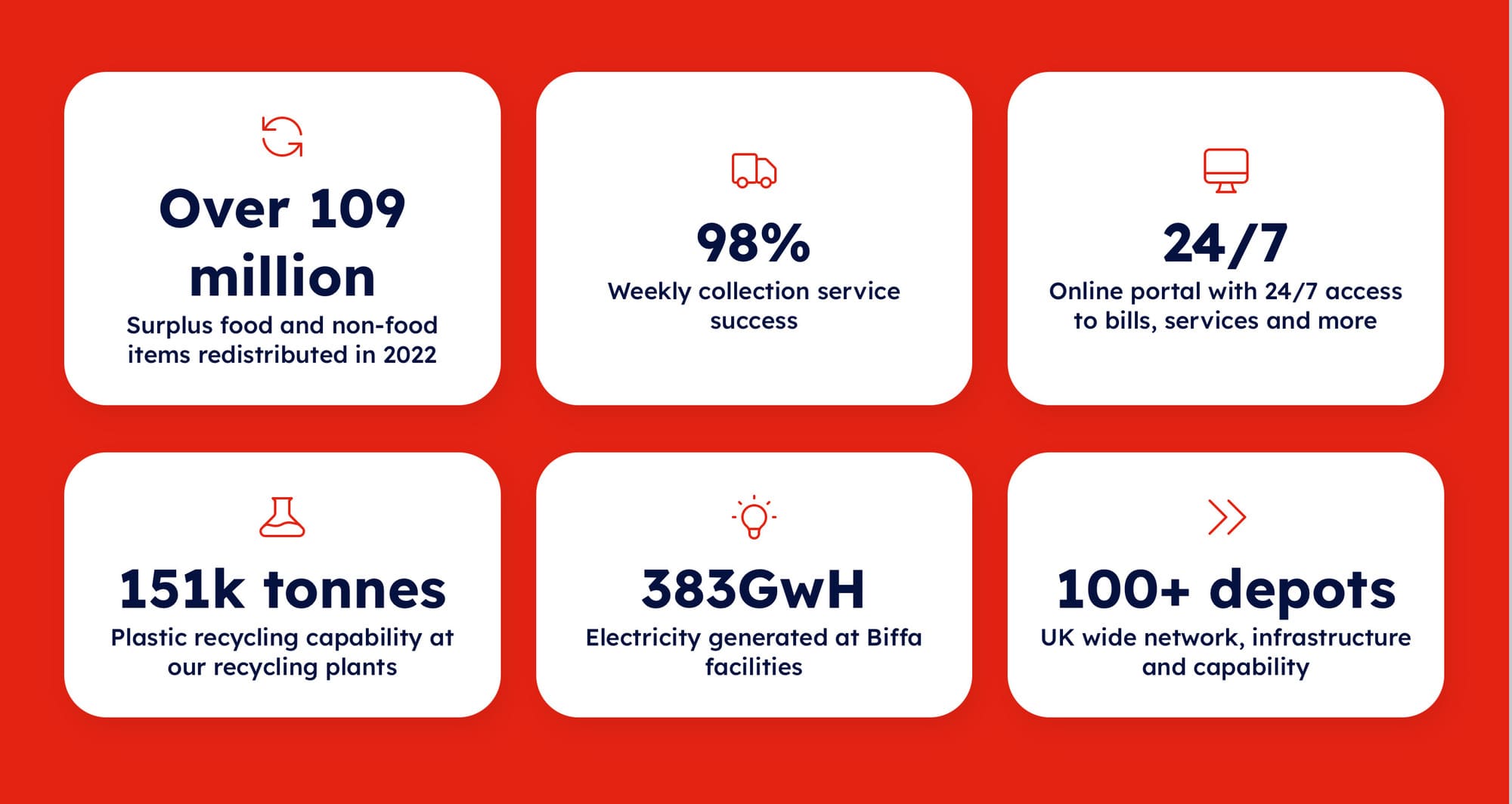Effective waste management is a critical component for businesses across the UK, not only to ensure compliance with regulations but also to support sustainability initiatives and cost efficiency. Biffa, one of the leading waste management providers in the UK, offers a range of commercial waste management services tailored to different business needs. Understanding how Biffa’s pricing structure works can help businesses make informed decisions about their waste management solutions.
Overview of Biffa’s commercial waste management services
Biffa provides a comprehensive suite of waste management services, including general waste collection, recycling, hazardous waste disposal, and more specialised services like food waste and confidential document destruction. These services are designed to cater to businesses of all sizes and sectors, from retail and hospitality to industrial and manufacturing.

Factors influencing Biffa’s pricing structure
The cost of commercial waste management with Biffa depends on several factors, which are important to consider when estimating potential expenses.
- Type of waste: Different types of waste require different handling and disposal methods. For example, general waste is typically cheaper to manage than hazardous waste, which requires special treatment and disposal procedures. Recycling services, depending on the materials, may also be priced differently.
- Volume and frequency: The amount of waste a business generates and the frequency of collection significantly impact pricing. Businesses that produce higher volumes of waste or require more frequent collections will likely face higher costs.
- Location: Where a business is located can affect the price due to logistical considerations. Businesses in remote or difficult-to-access areas may incur additional charges for waste collection. Conversely, businesses in urban areas may benefit from more competitive pricing due to the proximity to Biffa’s facilities.
- Service type: Biffa offers various service levels, from standard collections to more tailored solutions that might include on-site compactors or balers. Customised services, while offering greater efficiency, can come at a premium.
- Contract length: The length of the contract between a business and Biffa can influence pricing. Longer-term contracts often provide better rates, as they offer security and predictability for both parties.
- Environmental impact: With increasing emphasis on sustainability, businesses may opt for more eco-friendly waste disposal methods. Biffa offers recycling and waste-to-energy services, which can sometimes be more costly upfront but provide long-term environmental benefits and potential savings through reduced landfill tax.
Biffa waste collection and management price list
| Service Type | Description | Price (per collection) |
|---|---|---|
| General Waste | Standard waste collection (e.g., office waste) | £15 – £30 |
| Mixed Recycling | Collection of mixed recyclables (paper, plastic, etc.) | £10 – £25 |
| Food Waste | Collection of food waste for composting | £20 – £35 |
| Glass Recycling | Collection of glass bottles and jars | £10 – £20 |
| Confidential Waste | Secure collection and destruction of confidential documents | £50 – £100 |
| Hazardous Waste | Disposal of hazardous materials (chemicals, solvents) | £80 – £150 |
| Clinical Waste | Collection of medical waste | £40 – £80 |
| Waste Compactor Service | On-site compactor collection service | £200 – £400 (weekly) |
| Skip Hire (General Waste) | 8-yard skip hire for larger volumes of general waste | £180 – £250 |
| Waste-to-Energy Service | Processing waste for energy recovery | £50 – £100 |
Notes:
- Frequency Discounts: Discounts may apply for more frequent collections or long-term contracts.
- Additional Costs: Some services may incur additional charges for out-of-hours collections, special handling requirements, or remote locations.
- Compliance Fees: There may be regulatory compliance fees for handling certain types of waste, such as hazardous or clinical waste.
Biffa’s pricing transparency
Biffa strives to offer transparency in its pricing, providing detailed quotes that break down the various costs associated with their services. Businesses are encouraged to discuss their specific needs with a Biffa representative to receive a tailored quote. This approach ensures that businesses only pay for the services they require, without hidden fees or unexpected charges.
Comparing Biffa with other providers
When comparing Biffa’s pricing with other waste management providers, it’s crucial to consider not only the cost but also the value offered. Biffa’s extensive infrastructure, national reach, and commitment to sustainability are significant factors that contribute to its pricing. Cheaper alternatives may not offer the same level of service reliability, compliance support, or environmental benefits.
Cost-saving tips for businesses
To manage and potentially reduce waste management costs, businesses can consider the following strategies:
- Reduce waste generation: Implementing waste reduction strategies, such as optimising production processes and encouraging recycling within the workplace, can lower the volume of waste and reduce collection costs.
- Increase recycling: Segregating recyclable materials and using Biffa’s recycling services can be more cost-effective than disposing of all waste as general waste.
- Review contract terms: Regularly reviewing and renegotiating contract terms with Biffa can ensure that a business is getting the best possible rates, especially if waste generation patterns change.
- Consider on-site solutions: For businesses generating large amounts of waste, investing in on-site compactors or balers can reduce the frequency of collections and, consequently, lower costs.
Biffa pricing review – Our verdict
Biffa’s commercial waste management pricing is influenced by a variety of factors, making it essential for businesses to carefully assess their needs and work with Biffa to develop a waste management plan that is both cost-effective and sustainable. By understanding the key components of Biffa’s pricing structure, businesses can make more informed decisions, ensuring they achieve both compliance and efficiency in their waste management efforts.
For more, visit the Biffa website.
FAQ – Biffa pricing
Biffa calculates the cost of general waste collection based on factors like the type of waste, volume, and frequency of collections. For example, standard general waste collection might range from £15 to £30 per collection.
Biffa’s mixed recycling service starts at £10 per collection, with prices potentially reaching up to £25 depending on the volume and frequency of collections.
Yes, Biffa charges more for hazardous waste disposal due to the specialised handling required. Prices for hazardous waste disposal range from £80 to £150 per collection.
Biffa charges between £20 and £35 per collection for food waste, depending on factors like the size of the bins and the frequency of collections.
Biffa’s confidential waste disposal service, which includes secure document destruction, typically costs between £50 and £100 per collection.
Hiring a skip from Biffa for general waste disposal can cost between £180 and £250 for an 8-yard skip, depending on the duration of the hire and the waste type.
Yes, Biffa may apply additional fees for services such as out-of-hours collections, special handling requirements, or collections in remote locations. These fees can vary but might add an extra £20 to £50 to the base price.
Biffa’s waste compactor service is priced between £200 and £400 per week, depending on the size and type of compactor used.
Biffa charges between £10 and £20 per collection for glass recycling, depending on the volume of glass waste being collected.
Biffa’s waste-to-energy service, which processes waste to generate energy, costs between £50 and £100 per collection, depending on the type and volume of waste being processed.

